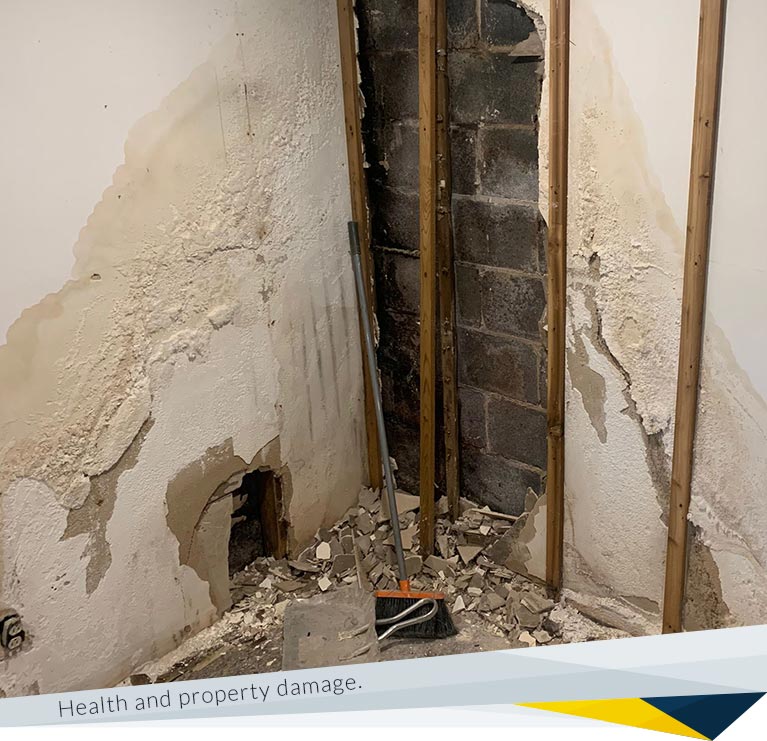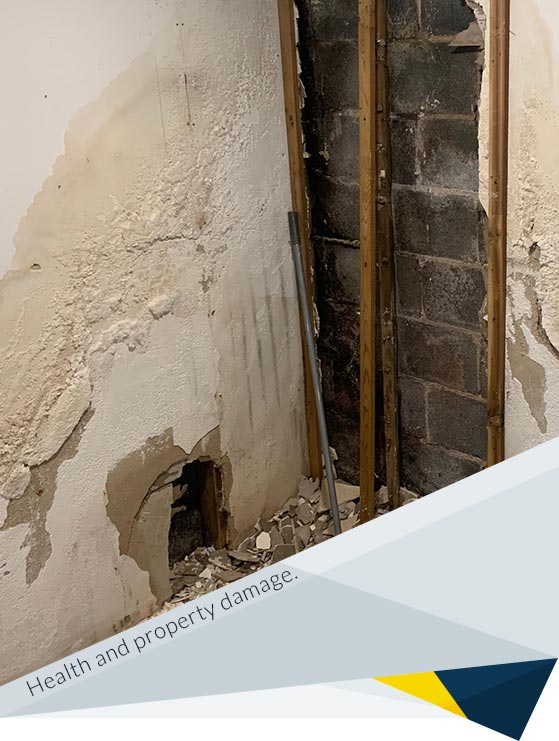
Mold is a nightmare that can cause various infections and allergies which can seriously impact your health. Statistics show that around 4.6 million asthma cases are the result of mold and dampness in homes and offices. That's pretty shocking, right? Here's what you should know about the common nature of mold, the health and property damage it can cause, and the best remediation approach.
About 45 million buildings in the United States have mold. Is the smell in your basement musty and pungent? If yes, then there is a high chance that you have mold. You may also notice some green, gray or black patches and stains on your floor, ceiling, or basement walls. Molds are quite common in damp and humid areas like basements, bathrooms, and attics.
The primary factors that lead to mold forming in the basement are excessive moisture and oxygen. Spills, leaks, and cracks in your foundation can all increase the moisture levels and accelerate the spread of mold. Such issues are not always easy to detect, and most people will never know their foundation needs repairs until they start seeing signs of mold in the basement.
It's never fun discovering mold in your house, but determining the causes of mold in basement makes it easier for professionals to fix the issue. Other than problems with the foundation, your basement can have excessive moisture due to:

Mold growing in the basement is dangerous because it harms your belongings and health. It also increases the chance of cross-contamination where the mold spores can spread to other parts of your house. Here are the dangerous effects of mold:
Most homeowners wonder if house insurance will cover the mold damage. Unless the mold formation was caused by a covered peril, your insurance company may not cover it. In cases where flooding has caused mold infestation, some insurance companies will only cover it if you have a separate flood insurance policy.
If you suspect black mold in your basement, there is a way that you can find out for sure. Expert mold testing using the latest technology is vital because it helps you confirm your suspicion. The testing will also determine the type of mold found and if it's toxic or not.
But what does basement mold look like? There are over a thousand mold species out there, and the testing results will let you know exactly what you're dealing with. Having this information in hand is vital in determining the most effective way to fight it. The common types of mold include:
White mold in basements grows in areas with a high amount of moisture. Though this type of mold does not produce mycotoxins, it can cause severe health complications in the respiratory system. If you identify that this is the type of mold present in your home or business, get a professional to guide you on how to get rid of it and prevent it in the future.
Black mold is commonly found on the walls of the basement. This type of mold requires immediate action because it releases tiny spores full of mycotoxins which are dangerous and cause numerous health issues. It's best to leave it to mold removal professionals who know the most effective and safest technique to get rid of it.
This type of mold is less commonly found indoors, but it comes in various colors and can travel easily through the air and spread to other areas of the house. You should call an experienced basement mold remediation expert as it requires a special approach to remove the green mold from your home.
You might be wondering how can you check for mold in the basement. Now that you know how basement mold looks like, checking for it is the first step of getting rid of mold in the basement. Some of the ways to check mold include:
If you realize that you have mold, start searching for professionals who can help. Certified mold testing experts have specialized tools to perform air tests, surface tests, and bulk tests. They will collect surface samples and mold air samples using special air traps, to come up with an effective plan on how to kill mold in the basement.
Once you identify the mold type, the challenge now is how to get rid of black mold in basement. Note that if you are not experienced in mold removal, you should avoid trying to remove it yourself since you can end up spreading the mold all over the house and make the situation worse. That's why this task is best left for professionals.
The best way to remove mold in the basement is to find a professional mold removal company with a good track record. Hiring the right company for the job is the only way to get the best results at competitive basement mold removal costs. Depending on the extent of the mold growth, they may completely seal the basement to prevent its spread and will then work on removing the mold.
There are different products available to kill mold, but you need to be cautious. Most products don't kill mold completely and can be harmful to your health. Professionals know the best eco-friendly mold cleaning products to achieve results without posing a danger to your family and home environment.
Do you have molds on your concrete basement walls? The first step is to assess the condition of the wall and the extent of the mold growth. If the wall is sound but covered with molds, cleaning the wall with special solutions will do the trick. But if the mold has outgrown into the drywall, you will have to remove all of the affected porous materials and replace them. Since this is not a small feat to accomplish, it's best to hire experts for the task.
Removing mold growth from concrete walls is less challenging. All that's needed to eradicate mold from the concrete are quality chemicals to spray on the surfaces. Professionals know the best products to buy depending on your specific mold type.
Most people assume that simply cleaning the mold is enough to get rid of it. But this is far from the truth and the mold will likely return after a short period of time. That is because cleaning it only removes mold from the surface, but it doesn't remove the mold that has already penetrated into the material itself.
If your basement has mold, you may also notice a strong and musty smell that is produced by some mold types. An air freshener won't help here and the smell will keep coming back until all the mold growth is removed. The best and most effective way to get rid of the mold and mildew smell is to have mold professionals handle the mold removal. They will ensure that all the moisture problems causing the mold will be addressed, and will advise you on how to keep your home properly ventilated.
Following mold prevention tips is crucial even after mold remediation. Here's what you can do to stop mold in the basement:
Mold treatment is a process of completely eradicating mold in the basement. It requires a lot of special equipment, methods, and experience to get the best results. You will need the help of mold remediation experts to get the work done. A professional mold treatment procedure involves:
The best and most effective way of preventing molds in your basement is having proper ventilation. You also need to ensure there is no excess moisture present and address any water leaks. It is also vital to do regular mold inspections to eliminate the problem before it escalates. If you experience an emergency like a flood, take action as soon as possible.
Mold and mildew are both fungi, but mildew appears fluffy and powdery. Both breed in humidity-sufficient areas and can be prevented with similar approaches. Speak to a mold specialist if you need additional information on mold prevention.
Mold removal is not a simple DIY project. A slight mistake could put you, your loved ones, and your property in danger.
At FDP Mold Remediation, we have the experience, skills, and tools required to deal with different types of mold in your basement. We are available 24/7 for all mold emergencies in New York, Florida, Texas, New Jersey, Maryland, and the District of Columbia. Call us now at 877-421-2614 to find out more about our mold inspection, mold testing, mold remediation, and basement mold removal services.



